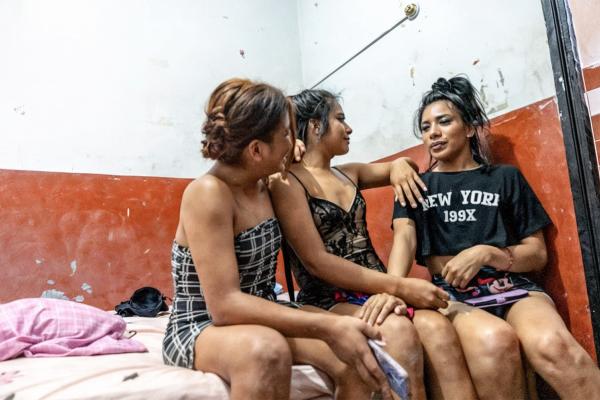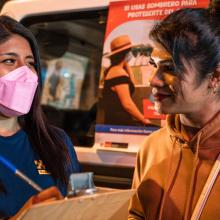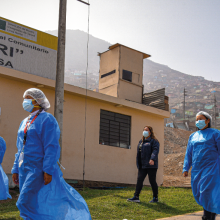If there’s one thing Paloma (21) misses about her native Condorcanqui, a province located in the department of Amazonas, it’s the regional food. That’s why she usually prepares tacacho with beef jerky in her room at ‘El Muro’. That’s how they nickname the large house in downtown Lima -which hosts transgender women like her- because of the concrete block that guards the entrance.
Her best diner is N., a 15-year-old trans teenager who a year ago also arrived from Condorcanqui to this old compound, located on Nicolás de Piérola Avenue. They share their food with Daniela (23), who, although she comes from Iquitos, feels she is a fellow countrywoman of her two neighbors. In the slow heat of the stove, a friendship has developed between the three of them.
“You can’t cook or eat alone,” says Paloma,
and you can’t work either. Late at night, the three of them usually go out together. It is a measure they have taken to confront situations of violence and discrimination to which they are exposed because of their gender identity. They, as well as 62.2% of trans women in Peru, according to figures from the Ombudsman’s Office, consider sex work as their only employment option.
At Socios En Salud (SES) we seek to get involved in these dynamics to provide closer health care to the transgender population, considered one of our priority communities due to their vulnerable condition. We know that, if we intervene in a comprehensive manner, we achieve greater adherence to the health system.
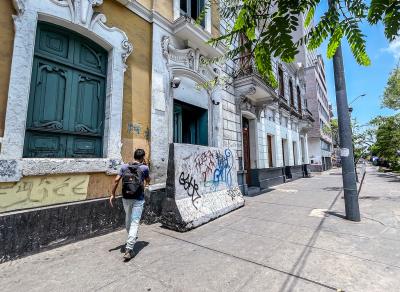
El personal de Socios En Salud visita “El Muro“, una antigua casona del Centro de Lima habitada por mujeres trans, quienes pagan entre 15 y 20 soles diarios por el alquiler de las habitaciones.
More than a health worker
Paloma says that she and her friends usually wake up between nine and ten in the morning. She, the most punctual among the three as Daniela jokes, starts her workday at four in the afternoon and returns to ‘El Muro’ at ten at night, although there are days when she gets a late start. “If I leave at ten or eight at night, I return at 12 or one in the morning,” she says.
At JunTrans, community intervention of our health programs, we align our actions taking into account these work schedules. “We try to understand each of them from their position. We don’t come as health personnel. The treatment is empathetic so that they open up to us,” notes Carla Rodriguez, project coordinator.
We start with the small details. If they are going to be screened for tuberculosis (TB), HIV or other sexually transmitted infections (STIs), then they are scheduled from noon until late at night. In addition, family spaces are considered to the community to initiate active screening of our key population.
One activity that graphically illustrates this disposition is our presence at the volleyball championships organized from time to time by the trans women of Lima. For example, at the inaugural tournament held in the Comas district on February 25, the JunTrans team attended and conducted 30 HIV tests. At SES we try to play on all courts.
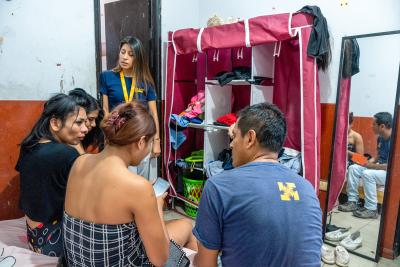
El equipo de JunTrans realiza una búsqueda activa entre la población transgénero para sensibilizar a la comunidad y alcanzar una mayor adherencia al sistema de salud.
Access to hormone therapy
Daniela is not homesick for the place where she was born. “I don’t like the jungle, it’s too hot,” she says. Agreeing with her are N. and Paloma, for whom the high temperatures in the Amazon cause burning over the areas of their bodies where they have injected oil and silicone because they could not afford cosmetic surgery or hormone intake.
“I would like to have everything done,” Paloma says. But financial constraints and health personnel not always trained in sexual and gender minorities lead many trans women to pay for risky alternatives to their health. JunTrans, in that sense, has undertaken a pilot of hormone therapy with seven beneficiaries who to date are treated free of charge at the Policlínico Socios en Salud, located east of the city of Lima.
Alberto Mendoza, an infectologist at Socios En Salud, stresses the importance of trained doctors monitoring the “hormone therapy for feminization”. “People who self-medicate run the risk of developing adverse effects from inappropriate medication or doses. They may also be developing mild effects, but if left untreated they can become complicated and very harmful,” she notes.
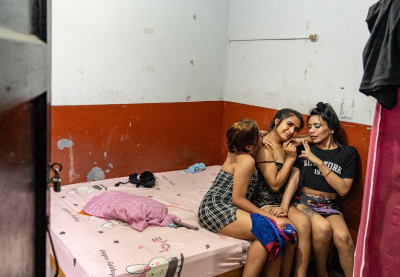
N., Paloma y Daniela, inquilinas de “El Muro“, se mantienen unidas para afrontar las dificultades que se les presenta en el trabajo y el día a día.
A step forward in mental health
Besides the tropical climate, the three friends of ‘The Wall’ acknowledge that there is another reason not to miss their homeland. “At the beginning there is always suffering,” says N. alluding to the unequal treatment she suffered at home because of her gender identity. “I don’t want to go back anymore, I got used to (Lima), there are districts that are nicer where there are tourists to meet,” Paloma adds with a laugh.
María Fernanda Amézquita, psychologist of the project, specifies that among the trans community cases of “past violence” exercised by the family abound. “Among the patients I came to screen, there was a lot of psychological and physical violence; in some cases, even sexual violence that they normalized out of shame or fear,” she said.
The evidence is corroborated by a survey that SES published in 2021: 82% of trans women in Lima presented depressive symptoms due to the discrimination and violence they suffer. That is why, from 2022 to the present, JunTrans has been offering a mental health care service for transgender adults.
Paloma, Daniela and N. - they know it well - are not alone.
